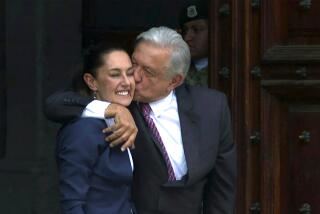PRI Experiment in Democracy Falls Short
- Share via
MEXICO CITY — In an ill-starred experiment with internal democracy, Mexico’s long-ruling Institutional Revolutionary Party chose a new leader Tuesday--the only candidate on the ballot.
The party’s failure to carry off an election with multiple candidates cast a pall over the victory of Jose Antonio Gonzalez Fernandez. Some analysts predicted that the turbulent election, marred by charges of manipulation, will intensify a power struggle in the party, known as the PRI.
“The differences within the party are sharpening. There is permanent uncertainty” about the PRI’s future, said Joel Estudillo, an analyst at the Mexican Institute of Political Studies.
If divisions in the party aren’t healed, “there is the possibility of a return of political violence,” he warned, referring to the bloodshed that accompanied the 1994 presidential campaign.
The PRI, however, wasn’t the only party failing at internal elections. In a reflection of the fragility of Mexico’s institutions, the main left-wing opposition group, the Democratic Revolution Party, is leaderless as well.
The party, known as the PRD, held a nationwide vote earlier this month to choose its new leader, but the contenders charged that it was tarnished by fraud. The PRD is now considering throwing out the results.
The election of party leaders is important because they will play key roles in the presidential race in 2000. That election is expected to be the most competitive in Mexico’s history.
In the past, the Mexican president selected a party leader and the PRI’s 370-member Political Council ratified the decision with a show of hands. On Tuesday, for the first time, council members voted by secret ballot, dropping paper slips into a clear plastic urn.
But critics said the new process didn’t mark much of an advance.
Gonzalez Fernandez, a former labor minister, had quickly gained the public support of party heavyweights who saw him as the choice of President Ernesto Zedillo, analysts noted.
One other candidate, former Congressman Rodolfo Echeverria, had entered the race March 22 after the resignation of the previous PRI leader, Mariano Palacios Alcocer. But Echeverria bowed out three days later, saying that senior party members favored his opponent.
“We don’t want to be participants in another episode that doesn’t contribute to the democratization or unity of our beloved party,” Echeverria declared.
Echeverria has been associated with critics of Zedillo and the free-market “technocrats” that dominate his Cabinet.
In Tuesday’s election, Gonzalez Fernandez received 262 votes, 26 ballots were declared null, and the rest of the council members failed to participate.
Analysts said Echeverria’s angry withdrawal thwarted the whole point of the party race: to confer legitimacy on the new PRI leader.
Gonzalez Fernandez “starts out weakened, there’s no doubt,” said Sergio Sarmiento, a political columnist. “It will take work to recover the lost ground.”
The main task of the new PRI leader will be to gain party support for a set of rules to choose the presidential candidate for 2000. The Mexican president’s tradition of choosing the PRI candidate was a process known as the dedazo, or “big finger.” But Zedillo has vowed not to do so this time and has proposed primaries instead.
Hurt by economic crises and corruption scandals, the PRI lost its majority in the lower house of Congress for the first time in 1997 midterm elections. But the party remains the largest in Mexico, controlling the Senate and the majority of governorships.
*
Greg Brosnan of The Times’ Mexico City Bureau contributed to this report.
More to Read
Sign up for Essential California
The most important California stories and recommendations in your inbox every morning.
You may occasionally receive promotional content from the Los Angeles Times.










